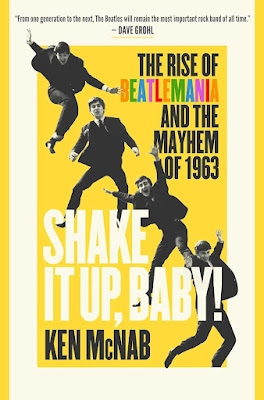Review: Ken McNab's 'Shake it Up, Baby!' is a Heavily Detailed Account of the Beatles' Breakthrough Year
Ken McNab provided a solid account of the Beatles' demise in his 2020 book, "And in the End: The Last Days of the Beatles." Here, he winds the story back to the beginning.
"Shake it Up, Baby!" recounts the Beatles' rise to national fame in Britain, and it should be especially interesting to American readers who tend to think that everything started in February 1964, when the band arrived on our shores for "The Ed Sullivan Show."
The book provides a month-by-month account of the year, which, in January, finds the band already quite busy, and already quite famous. The Beatles' schedule was jam-packed with regional performances booked by their enthusiastic new manger, Brian Epstein, with each show bringing them new fans, and, often, news stories about how these appearances stirred up strange new reactions in their audiences - namely, hysterical screaming that nearly drowned out the band's music.
The Beatles were charismatic, funny, down-to-earth and, with their songs and with their haircuts, something entirely new. Kids, and the press, were fascinated by them.
McNab captures this excitement and demonstrates, step-by-step, how the Beatle built their following among fans and the media, leading, ultimately, to their national TV appearances on "Saturday Night at the Palladium," in October, and in front of members of the royal family, on "The Royal Command Performance" in November. These shows solidified the band a household name in England and set the ground for their quick rise to fame in the U.S. and beyond.
McNab's breakdown of how it all happened is fascinating and useful in terms of the Beatles' historiography. Yet, he's reluctant to let any detail slip by. Especially in the early chapters, where he provides context for what happened to the Beatles before 1963, his sentences become crowded with trivia and the narrative flags. The onslaught of information - not all of it necessarily necessary - threatens to drown the reader in minutia. As the book goes along, however, McNab gives us a bit more breathing space.
He also provides us with a nice selection of quotes that breathe life into the story. We hear from the Beatles, of course, and those around them, along with people, famous and not, who recount their stories of seeing and, in some cases, meeting, the band.
The major flaw to the book, beyond it's occasional descent into sheer trivia, is the lack of citations. McNab sometimes mentions in the text where a particular quote comes from, but often he neglects to do so. As readers, we're left wondering where McNab got all of his information. In some cases, the quotes (I think) come from interviews he's done. But in many other cases, we know this can't be the case because quoted folks such as Brian Epstein, Derek Taylor, John Lennon and others are no longer with us, and haven't been for a long time.
This lack of citation undercuts the book's credibility unnecessarily, which is too bad. It also makes it less useful as a source of information for folks like me, who research and write about the Beatles.
All in all, however, McNab's book is a very good - if not the definitive - account of the Beatles in, perhaps, their most pivotal year.
- John Firehammer

Comments
Post a Comment